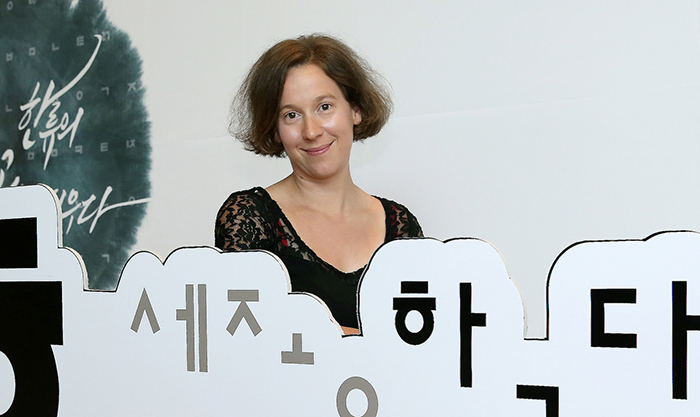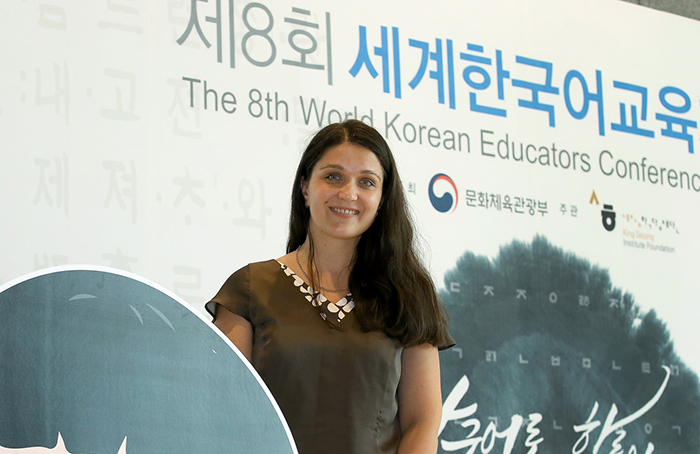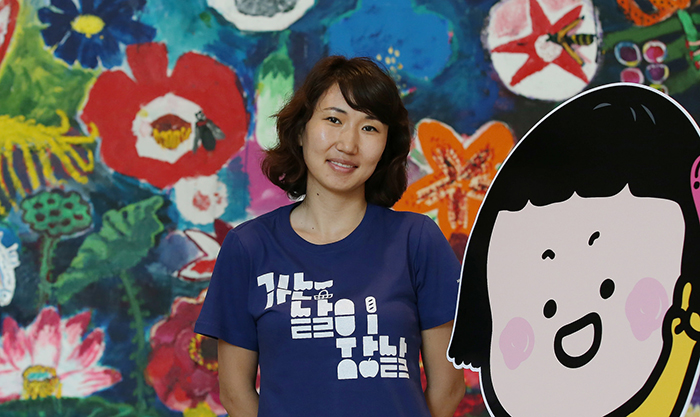- 한국어
- English
- 日本語
- 中文
- العربية
- Español
- Français
- Deutsch
- Pусский
- Tiếng Việt
- Indonesian
On July 12, teachers from 88 King Sejong Institutes from 42 countries, including Nepal, Russia, Mongolia, Vietnam, Bulgaria, the Czech Republic, Kazakhstan, Thailand and mainland China, just to name a few, gathered in Seoul for a special conference. The eighth World Korean Educators Conference, held at the National Museum of Korea, brought them together to build networks among themselves, both Korean and non-Korean teachers.
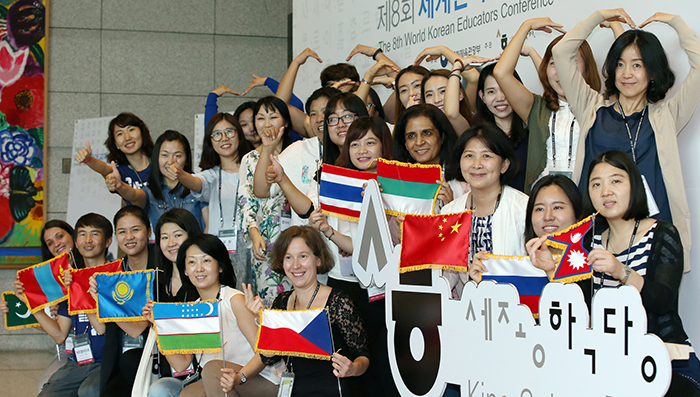
A group of Korean language teachers from 88 King Sejong Institutes from around the world smile as they hold their own national flag during the eighth World Korean Educators Conference in Seoul on July 12.
The conference began with the president of the King Sejong Institute Foundation, Song Hyang-keun, delivering letters of designation to each representative from the nine new institutes that opened so far this year in Vietnam, Latvia, Bahrain, Malaysia, Myanmar, New Zealand, Australia and Poland.
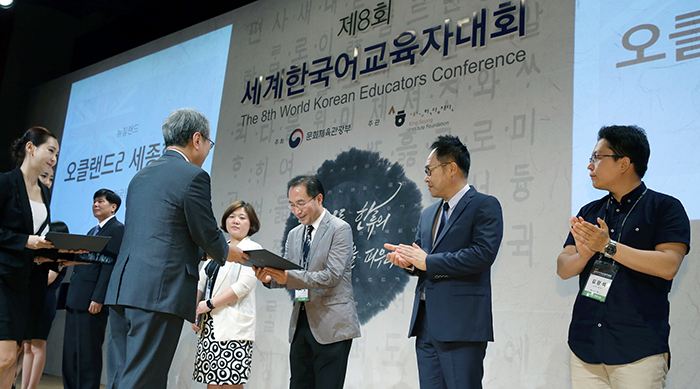
President Song Hyang-keun of the King Sejong Institute Foundation awards letters of designation to representatives from the nine newly-opened King Sejong Institutes, during the eighth World Korean Educators Conference in Seoul on July 12.
Following the ceremony, three experts from academia, broadcasting and the entertainment industry talked about the way in which the Korean language is spreading around the world. They also discussed ways to further disseminate the language to a wider audience.
Professor Cho Hyun-yong from Kyung Hee University, part of the three-member panel, said that the way Korean-speakers say uri (우리), or “our” in English, when they refer to, say, uri-jip (우리집) -- either "our home" or "my home" in English -- represents the strong sense of community that is embedded in the Korean grammar system. The professor also pointed out that such expressions as mi-woon-jeong or go-woon-jeong (미운정, 고운정), which mean, "having some degree of affection toward someone, even though I hate them," and the saying, “I give another piece of rice cake to someone who I dislike" (미운놈 떡 하나 더 준다), both show how people have and express jeong (정, 情), an emotional bond or affection.
“You can quickly learn people’s thoughts and ideas in the language itself,” said Cho. “It would be perfect if we could not only teach the exact meaning of each word and expression, but also help learners realize what kinds of thoughts and emotions the word embraces,” he said.
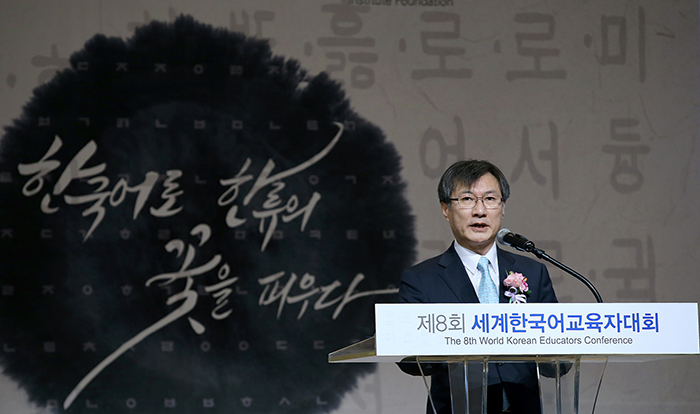
First Vice Minister Jeong Kwan-joo of the Ministry of Culture, Sports and Tourism gives the opening address at the eighth World Korean Educators Conference in Seoul on July 12.
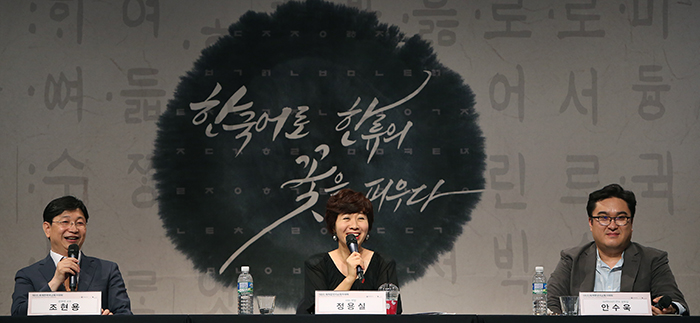
Kyung Hee University Professor Cho Hyun-yong (left), KBS anchor Jeong Yong-sil (center) and Ahn Soo-wook, director of the Overseas Alliance & Cooperation department at SM Entertainment, answer questions during the 'Korean Language Blooms -- the Korean Wave' forum, part of the eighth World Korean Educators Conference.
“The reason why fans around the world are crazy for Korean soap operas and pop music, in particular, is that there’s a specific subject to which they devote their affection,” said Ahn Soo-wook, director of the Overseas Alliance & Cooperation department at SM Entertainment, one of K-pop's top talent agencies. “The fans express their love for their favorite singers and actors by learning the Korean language they hear in a song or a film. They even make banners in Korean for their favorite stars. The huge popularity of Korean singers and actors, naturally, kindled their interest in the language.”
Two non-Korean stars -- Alberto Mondi from Italy and Mark Tetto from the U.S. -- who gained popularity with their witty remarks in fluent Korean on the JTBC talk show “Non-Summit Meeting" (비정상회담), appeared on stage and shared with the audience the experiences and struggles they faced in the process of learning Korean.
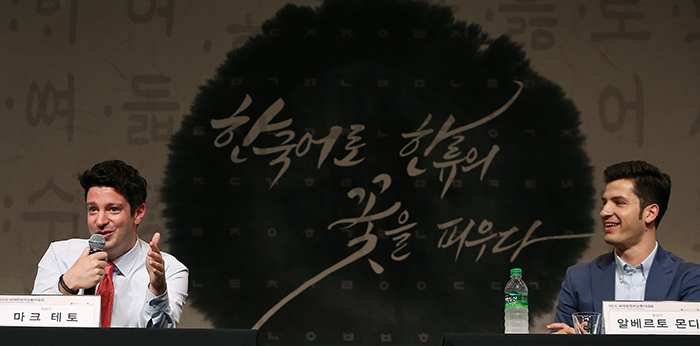
Mark Tetto from the U.S. (left) and Alberto Mondi from Italy, stars in JTBC's “Non-Summit Meeting” talk show, talk about how they learned Korean over the years.
Mondi, who has lived in Korea for nine years, said, “I never studied at a language school or something. I learned it while working at a company and getting married to a Korean person. Soon after I started learning the language, I felt a deep affection for the language, as it has a variety of moving expressions. Then I continued to learn. Remember that without any pain or sweat, you won't be able to acquire any language, I'm sure.”
The U.S. star said that his interest in Korean kicked off the first time he saw the famous movie “My Sassy Girl" (엽기적인 그녀) in university. He has since been in love with all things Korean enough to have bought, and currently live in, a traditional Hanok home in the neighborhood of Bukchon, known for its traditional homes.
“The key to learning the language to perfection is to get used to natural expressions that can be used in daily dialog, instead of those just from books. I’ve made endless ridiculous mistakes using certain expressions with perfection, including honorific forms of expression. I learned a lot from such mistakes. Don’t be afraid of making mistakes. Just speak up,” Tetto said.
Participants who flew to Seoul to attend the conference will stay in the capital until July 15, and attend training programs so as to gain a deeper understanding of Korean pronunciation and vocabulary. The group will also take part in a competition that will anoint the best teachers, and receive a tour of the National Hangeul Museum.
1. Linda Stockelova teaches at the King Sejong Institute in Prague, the Czech Republic.
- What got you interested in the Korean language?
It was in 2013 when the first King Sejong Institute opened its doors in the Czech Republic. I’ve been teaching there for three years. I learned about Korea when I first saw a movie called “Old Boy” and started to learn more about what the country looks like. When I first heard the Korean language in the movie, it sounded beautiful. I wanted to learn the language. In 2011, I had a chance to study at Sungkyunkwan University for six months and during that time I was able to improve my Korean. It was really difficult at first, but the more I learned, the more interesting I found it.
- How popular is the Korean language and South Korea in general in your country?
In the Czech Republic, people are getting more and more interested in South Korea, its language and its traditions. Many people listen to K-pop and watch Korean movies and soap operas, as well. The “Lovers in Prague” soap opera was a real sensation, especially because it was set in Prague. “She was Pretty,” “My Love from the Star” and others, too, are very popular. As many Korean conglomerates, like Samsung and Hyundai, do business in the Czech Republic, the nation of South Korea has become familiar to the Czech people.
- What do you want to do next with your Korean skills?
I’d like to keep teaching. I'll try to communicate more with my Korean friends and watch more Korean movies and dramas in order to improve my listening and speaking skills.
2. Raina Borissova Beneva teaches at the King Sejong Institute in Sofia, Bulgaria.
- What got you interested in the Korean language?
I first learned about Korea 16 years ago. At the time, Korean wasn't as well-known as Mandarin or Japanese. It was my curiosity that made me want to learn the language, which was new to me. Then I got interested in Korean society, and I started to get a deeper understanding of the language.
- How popular is the Korean language and South Korea in general in your country?
The popularity of all things Korean is growing in Bulgaria these days, to the point where almost all Bulgarians know about South Korea. Their interest goes beyond just consumer products, and includes the language, art, music and, especially, traditional things like gugak (국악).
- What do you want to do next with your Korean skills?
I want to help more Bulgarians learn about South Korea, its language, its history and its traditions. With that in mind, I’ve been teaching at the King Sejong Institute for two years now. The most rewarding moments I have when teaching are when I can see in students' eyes a strong interest, passion, joy and gratitude. I feel happy when I teach.
3. Valentina Tsybikova teaches at the King Sejong Institute in Ulan-Ude in Buryatia, in Russia.
- What got you interested in the Korean language?
I first studied for a master's in contemporary Chinese literature at Buryat State University. In 2007, I had a chance to study as an exchange student in South Korea, and that’s when I started to get interested in the place and its language. I studied the language really hard.
- How popular is the Korean language and South Korea in general in your country?
I’ve been teaching 10 students out of the 80 students at the King Sejong Institute over the past two years. My students vary in age from middle and high school students through to college students. In Russia, Korean pop groups, like Big Bang and Exo, are really popular. Many Russians also love to watch Korean soap operas.
- What do you want to do next with your Korean skills?
My Korean is still far from perfect. I’d like to improve my Korean skills and become a better teacher.
By Sohn JiAe
Korea.net Staff Writer
Photos: Jeon Han
jiae5853@korea.kr
